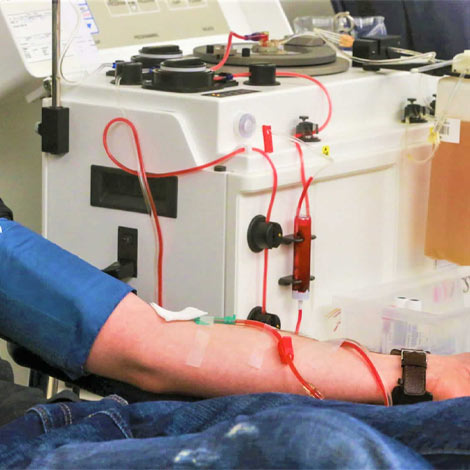Dialysis Hospital in Vijayawada
Hemodialysis and plasmapheresis are vital medical procedures used in the treatment of various conditions related to kidney function and autoimmune disorders. Understanding these procedures, their purposes, and how they work is essential for patients, caregivers, and medical professionals alike. In this comprehensive guide, we delve into the intricacies of hemodialysis and plasmapheresis, shedding light on their significance in healthcare.
What is Hemodialysis?
Hemodialysis is a medical procedure used to remove waste products and excess fluids from the blood when the kidneys are unable to perform this function adequately. It is commonly employed in the treatment of kidney failure or end-stage renal disease (ESRD). During hemodialysis, blood is circulated outside the body through a dialysis machine, where it is filtered to remove toxins and then returned to the body.

How Does Hemodialysis Work?
The process of hemodialysis involves the use of a dialysis machine to filter the blood outside the body. This machine consists of specialized filters called dialyzers, which mimic the function of the kidneys by removing waste products, such as urea and creatinine, from the bloodstream. During a hemodialysis session, the patient's blood is circulated through the dialyzer, where it comes into contact with a dialysate solution. This solution contains electrolytes and other components necessary for maintaining proper fluid and chemical balance in the blood.
Indications for Hemodialysis
Hemodialysis is typically indicated for individuals with severe kidney dysfunction, either as a temporary measure in cases of acute kidney injury or as a long-term treatment for chronic kidney disease. Common indications for hemodialysis include:
- End-Stage Renal Disease (ESRD): Patients with irreversible kidney damage often require regular hemodialysis to sustain life in the absence of functional renal tissue.
- Acute Kidney Injury (AKI): Hemodialysis may be necessary for patients experiencing sudden and severe kidney dysfunction due to factors such as infection, trauma, or drug toxicity.
- Electrolyte Imbalance: Hemodialysis is effective in correcting abnormal levels of electrolytes, such as potassium and sodium, which can pose serious health risks if left untreated.
- Fluid Overload: In conditions where the body retains excess fluid, such as congestive heart failure or advanced liver disease, hemodialysis helps remove the accumulated fluid and alleviate symptoms of fluid overload.
What is Plasmapheresis?
Plasmapheresis, also known as therapeutic plasma exchange, is a medical procedure designed to remove harmful substances from the plasma component of the blood. Unlike hemodialysis, which focuses on filtering the entire blood volume, plasmapheresis targets specific components of the blood to address autoimmune disorders, neurological conditions, and certain toxicities
How Does Plasmapheresis Work?
During a plasmapheresis procedure, blood is drawn from the patient through a catheter or vascular access device and circulated through a device called a plasmapheresis machine. Within this machine, the blood undergoes separation into its individual components, with plasma being isolated and removed from the circulation. The separated plasma is then replaced with a substitute solution, such as albumin or saline, before being reinfused back into the patient's bloodstream.
Indications for Plasmapheresis
Plasmapheresis is indicated for a variety of medical conditions characterized by aberrant immune responses, toxic exposures, or metabolic abnormalities. Some common indications for plasmapheresis include:
- Autoimmune Disorders: Conditions such as myasthenia gravis, Guillain-Barré syndrome, and systemic lupus erythematosus (SLE) often respond favorably to plasmapheresis, which helps remove autoantibodies and inflammatory mediators from the bloodstream.
- Neurological Disorders: Plasmapheresis may be employed in the management of neurological conditions like chronic inflammatory demyelinating polyneuropathy (CIDP), multiple sclerosis (MS), and certain cases of encephalitis or myelitis, where immune-mediated damage to nerve tissues occurs.
- Toxic Exposures: In cases of acute poisoning or drug overdose, plasmapheresis can facilitate the rapid removal of toxic substances from the bloodstream, preventing further harm to vital organs and tissues.
- Metabolic Disorders: Rare metabolic conditions, such as familial hypercholesterolemia or hereditary angioedema, may benefit from plasmapheresis to reduce circulating levels of pathogenic molecules and alleviate symptoms.
hemodialysis and plasmapheresis represent two indispensable modalities in the realm of medical therapeutics, offering hope and relief to countless individuals grappling with serious health challenges. While hemodialysis serves as a lifeline for patients with kidney failure, plasmapheresis emerges as a targeted intervention for various autoimmune, neurological, and toxicological disorders. By harnessing the power of modern medical technology, healthcare providers can continue to refine and optimize these treatments, ensuring improved outcomes and enhanced quality of life for patients worldwide.
Best healthcare providers

Unmatched Nursing Support

Top-notch Patient Care

Hospitable environment

Phenomenal intervention

